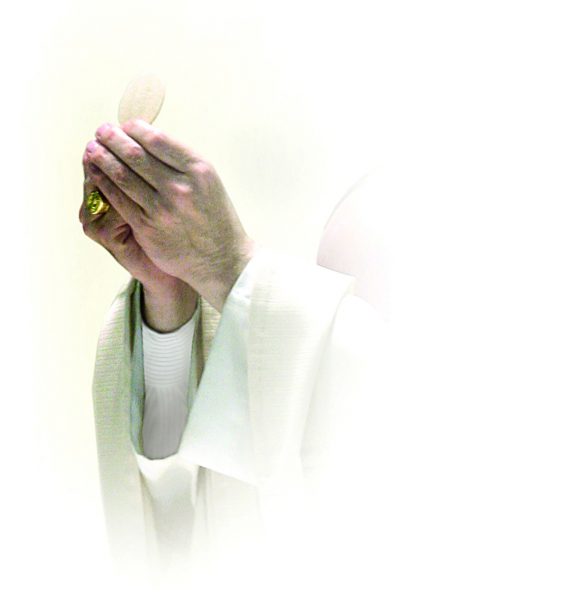National study associates understanding of the faith with frequency of Mass
Infrequent Mass-goers don’t understand that the bread and wine consecrated at Mass become the Body and Blood of Jesus Christ
A national study that revealed ignorance by Catholics about the Catholic Church’s teaching regarding transubstantiation indicates a need for better faith formation.
A study by the Pew Research Center reports that 69 percent of the Catholics they surveyed believe that during a Mass the bread and wine used for Communion “are symbols of the body and blood of Jesus Christ.” Of those surveyed, 31 percent said they believed the bread and wine actually become the body and blood of Jesus.
The study’s numbers change substantially for those who attend Mass weekly or more frequently. Among those in the frequent Mass-goer group, 63 percent believe what the church teaches about transubstantiation and 58 percent understand the church’s teaching. For Catholics who go to Mass monthly or yearly, the percentage who believe in transubstantiation drops to 25 percent, and down to 13 percent for those who seldom or never go to Mass.
Fr. Tom Hoisington
Fr. Thomas Hoisington, who serves as the Adult Faith Formation Instructor for the Diocese of Wichita, said in an emailed response that poll results are easy to manipulate and invite skepticism.
“However, it doesn’t matter whether a poll says that 99 percent or 9 percent of Catholics believe in the Real Presence of the Eucharist, the church’s response ought to be the same,” he said.
“The Vatican II Catechism calls the Eucharist ‘the source and summit of the church’s life.’ The devout and reverent celebration of the Eucharist strengthens belief more than any lecture, homily or essay. The devout and reverent celebration of the Mass includes more focus upon God than upon man, fidelity to the church’s rubrics and teachings about the fitting reception of Holy Communion, and the use of musical texts that are wholly biblical in origin.”
Fr. Chad Arnold
Father Chad Arnold, director of the diocesan Vocations Office, said his first thoughts are of John 6.
“We are told that when Jesus gave his great Bread of Life Discourse, many of his followers no longer walked with him. I would imagine many of those followers who fell away were only occasional listeners of Jesus. It is a hard teaching and would be especially hard for a person who only listens to Jesus occasionally or nominally,” he said, adding that it is not surprising that the more infrequently a person attends Mass, the less likely they are to believe in the real presence. “I don’t think we needed a national poll to tell us that!”
Regarding those who attend Mass regularly, Fr. Arnold said, at first glance it’s sad that that number is not higher. “However, it also signals where we need to move as a church. We have been given something priceless, wonderful, glorious – there are not enough adjectives to describe the gift that is the Eucharist. And it is sitting right in front of people!”
What needs to be done is to help those who don’t understand transubstantiation see that, he said.
“We don’t have to come up with something new, or exotic, or different, simply bring people to the truth. Bring them to the source and summit of our faith, the Eucharist! Personally, that is the work I want to do.”
Although having a thorough understanding about the church’s teaching about the Eucharist is good, Fr. Arnold said, personal witness is always beneficial.
“Children who see their parents and grandparents reverently and joyfully receiving our Lord. Parishioners seeing priests who celebrate the Mass as the church intends. What we love, we naturally share. When we know the truth, when we love the truth, we can’t but help to share the truth.”
Father Arnold added that he can understand the correlation of low Mass attendance and ignorance of the church’s teachings about the Real Presence. “I suppose I may be a little nave, but I struggle to understand how a person can truly believe in the real presence and consciously choose to miss Mass,” he said.
Bishop Carl A. Kemme
Bishop Carl A. Kemme said that while the Pew report is alarming and disappointing, especially to those who have the responsibility for the faith formation of the faithful, “it nevertheless should encourage us to continue to teach the full truth about the mystery of the Eucharist.”
He said his hope and prayer is: “That as a diocese, with our priorities of formation in Evangelization, renewal of Stewardship As a Way of Life and parish and family renewal by Reclaiming Sunday as the Day of the Lord, our Eucharistic liturgies – especially those on Sunday – will always move the minds and hearts of our people to greater faith in and reverence for the Real Presence of Jesus.”
Bishop Robert Barron, auxiliary bishop of the Archdiocese of Los Angeles and popular speaker, said he was angry when he saw the result of the poll. “Once of our principal jobs as Catholics is to pass on the faith in its itegrity,” he said in a broadcast.
Yes, we care for the poor, we worship God, he said, but we also catechize, we also evangelize.
“We also teach the faith. We’re not talking here about a minor piece of Catholic trivia,” he said. “We’re talking about one of the most central teachings of our faith. In fact, in terms of the sacraments, the, I’d say, central teaching of the faith.”
What does the catechism say?
For more about the Sacrament of the Eucharist begin reading chapter 1322 of the Catechism of the Catholic Church.
The Eucharist is the “source and summit of ecclesial life,’ the catechism says. “At the heart of the Eucharistic celebration are the bread and wine that, by the words of Christ and the invocation of the Holy Spirit, become Christ’s Body and Blood.”
The catechism is available at any Catholic book store or at usccb.org or vatican.va.

